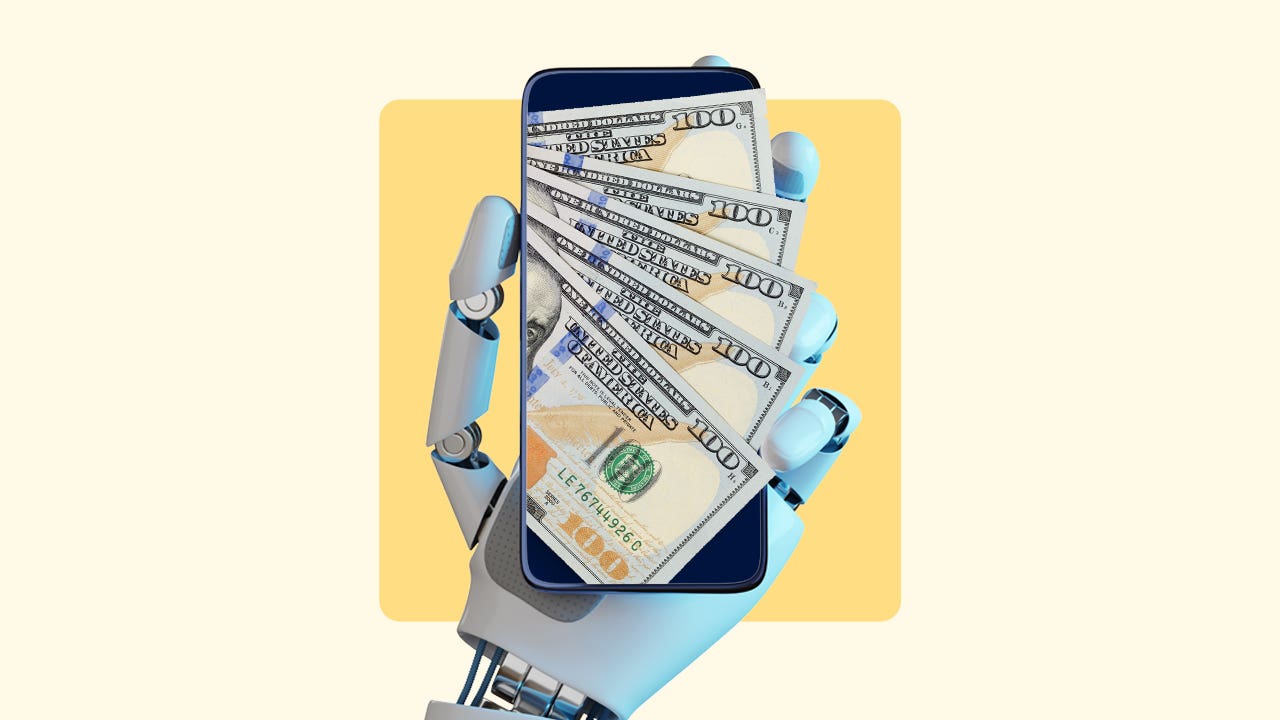11 AI-powered apps that help you save money




Key takeaways
- AI savings apps use machine learning to analyze your spending patterns and offer personalized strategies.
- These apps can automatically cancel unwanted subscriptions, find better deals and optimize your budget based on your behavior.
- Popular AI-powered tools like Cleo, Rocket Money and Hopper can save users an average of $80 to $500 annually.
- Most AI finance apps are free or low-cost, making them an accessible alternative to expensive financial advisors.
Most Americans feel uncomfortable with their emergency savings — and for good reason. According to Bankrate’s latest research, building a financial cushion feels impossible when you’re drowning in forgotten subscriptions, overpaying for everything and manually tracking expenses that slip through the cracks.
AI-powered finance apps solve that problem by doing the heavy lifting for you. These tools learn your spending habits, spot money-wasting patterns you’d never catch yourself, and automatically implement savings strategies tailored to how you actually live. Think of them as a financial advisor who works 24/7 in your pocket — minus the $200/hour fee.
Here are the 11 AI apps actually worth downloading in 2026.
Best AI-powered apps to save money
1. Cleo: Best AI chatbot for personalized savings
Cost: Free basic plan; $2.99-$14.99/month premium
Cleo treats savings like a conversation, not a punishment. Ask “Can I afford this vacation?” and its AI chatbot answers based on your actual income and spending — not generic advice that ignores your reality.
What sets it apart: The app’s autosave feature analyzes your cash flow and sets aside amounts you genuinely won’t miss. You can even create “spending fines” that automatically save $5 every time you hit Starbucks.
Real results: Users report saving 15-20% more than with traditional budgeting apps because Cleo makes it impossible to ignore your financial reality. The AI provides real-time feedback like “You’ve spent $340 on takeout this month — that’s 3x your usual.”
App ratings: 4.6 (Apple), 4.4 (Google Play)
2. Rocket Money: Best for managing recurring payments
Cost: Free version available; $6-$12/month premium (7-day trial)
Rocket Money’s AI hunts down subscriptions you’ve forgotten — and cancels them for you. Most users discover they’re hemorrhaging $50-$100 monthly on services they never use.
What it does: The app scans your transactions, identifies recurring charges, and handles cancellation — no calling customer service or navigating deliberately confusing websites. The Smart Savings feature then predicts how much you can save every few days without affecting your cash flow.
The catch: Premium features include bill negotiation (where Rocket Money argues with your cable company for lower rates) and smart savings automation. But even the free version catches forgotten subscriptions.
App ratings: 4.5 (Apple), 4.6 (Google Play)
Rocket Money is also one of Bankrate’s picks for overall best money-saving apps. Check out the rest of the list here.
3. GridRewards: Best for turning energy savings into cash
Cost: Free (available in NY, CA, TX)
GridRewards pays you real money — not points — to reduce energy use during peak demand. NYC users averaged $80 annually. Top participants earned $500.
How it works: The app predicts when your local power grid faces highest demand, then sends alerts asking you to reduce consumption for 1-2 hours. Turn up your thermostat or skip running the dishwasher, and GridRewards deposits cash directly into your account.
Why it matters: You’re helping prevent blackouts while getting paid. The app also tracks your energy usage year-round and suggests ways to lower your bills permanently.
App ratings: 4.6 (Apple), 4.5 (Google Play)
Availability note: Currently limited to select areas in New York, California, and Texas. Check if your area qualifies before downloading.
4. Origin: Best all-in-one financial planning
Cost: $12.99/month or $99/year (7-day free trial)
Origin bridges the gap between automated tools and human expertise. The AI assistant “Sidekick” analyzes your complete financial picture, then actual Certified Financial Planners are available when you need real human advice.
What you get: AI-driven spending analysis, personalized budget recommendations, goal tracking, and optional sessions with CFPs. The app also offers a high-yield cash account and automated investing options — everything in one place.
Best for: People who want automation with a safety net. The AI handles day-to-day optimization while human advisors tackle complex decisions like tax strategies or retirement planning.
App ratings: 4.6 (Apple), 4.2 (Google Play)
5. Copilot: Best premium budgeting for Apple users
Cost: $13/month or $95/year (30-day free trial)
Copilot is iOS-only, but Apple users get the most sophisticated budgeting AI available. The app learns how you spend money and refines its categorization system automatically — meaning it gets smarter the longer you use it.
Standout features: Dynamic budget adjustments based on spending changes, rollover balances that don’t punish you for going over one month, and investment tracking including crypto and real estate.
The verdict: Worth the premium price if you’re serious about optimization. Casual budgeters should start with free options.
App rating: 4.8 (Apple only)
6. QuickBooks: Best for business owners
Cost: $0-$275/month depending on features
QuickBooks’ Intuit Assist uses AI to automate bookkeeping tasks that cost hundreds monthly if you hire someone. The system handles expense categorization, invoice creation, cash flow predictions, and tax preparation.
Real business impact: Accurate financial records maximize tax deductions and identify inefficiencies. The automation reduces need for expensive accounting services — often paying for itself immediately.
Upcoming features: AI agents will handle routine bookkeeping tasks entirely, reducing manual data entry to nearly zero.
App ratings: 4.7 (Apple), 4.6 (Google Play)
7. Magnifi: Best AI for investing research
Cost: $14/month or $132/year (7-day free trial)
Magnifi’s AI assistant answers complex investment questions and provides personalized portfolio recommendations based on your risk tolerance. Ask “What are the best dividend stocks for retirement?” and get research-backed answers, not generic lists.
What it offers: Investment research, portfolio analysis for better diversification, goal tracking for long-term planning.
Who needs it: DIY investors who want institutional-grade research without paying for a financial advisor.
App ratings: 3.9 (Apple), 3.9 (Google Play)
8. PortfolioPilot: Best for advanced portfolio optimization
Cost: Free basic; $29-$99/month premium ($240-$828/year, 14-day trial)
PortfolioPilot delivers AI-powered analysis typically available only to institutional investors. The algorithms identify portfolio inefficiencies, suggest rebalancing strategies, and uncover tax optimization opportunities.
Advanced features: Asset allocation optimization, tax-loss harvesting strategies, scenario modeling, fee analysis.
Platform: Web-based, mobile-optimized (no native app)
Best for: Serious investors with complex portfolios who want to minimize fees and maximize tax efficiency.
Related reading: Best online brokers for beginner investors.
9. PayPal Honey: Best for automatic shopping discounts
Honey automatically finds and applies the best coupon codes during online checkout at 30,000+ retailers. The average user saves $126 annually without doing anything.
How it works: Install the browser extension. When you check out online, Honey automatically tests every available coupon code to find the best discount. The app also tracks prices and alerts you when items drop.
The catch: Lower app store ratings reflect frustration when codes don’t work—but the app is free and requires zero effort.
App ratings: 3.6 (Apple), 1.4 (Google Play)
10. Hopper: Best for travel savings
Cost: Free
Hopper’s machine learning predicts optimal booking times for flights and hotels with 95% accuracy. The app analyzes billions of data points to show when prices will rise or fall.
Real savings: Users save 20-40% compared to random booking times. The app shows historical pricing trends and recommends exact dates to book—often saving hundreds on travel expenses.
Additional features: Price freeze options, flexible booking, exclusive travel deals.
App ratings: 4.8 (Apple), 4.6 (Google Play)
11. Waze: Best for reducing gas costs
Cost: Free
While primarily a navigation app, Waze uses AI to optimize routes for fuel efficiency. The app combines traffic analysis with user-generated data to minimize time in traffic and identify cheapest nearby gas stations.
Fuel-saving features: Real-time traffic analysis, route optimization that minimizes idle time, gas station price comparisons, hazard alerts.
Why it matters: Optimized routing can reduce fuel consumption by 10-15% compared to standard navigation apps.
App ratings: 4.8 (Apple), 4.1 (Google Play)
How to choose the right AI finance app
Match the app to your biggest money problem:
- Bleeding money on subscriptions? Start with Rocket Money — it pays for itself immediately.
- Can’t stick to budgets? Try Cleo’s automated savings that work around your behavior, not against it.
- Serious about investing? PortfolioPilot or Magnifi provide institutional-grade analysis at consumer prices.
- Business owner? QuickBooks automates bookkeeping that would otherwise cost hundreds monthly.
- Want comprehensive planning? Origin combines AI automation with access to human CFPs.
The smart approach: Start with free apps like Rocket Money, Honey, and Waze. Once you’re saving consistently, upgrade to premium tools like Origin or PortfolioPilot for advanced optimization.
Bottom line
AI finance apps work because they remove the willpower equation. You don’t need discipline when your phone automatically identifies waste, negotiates better rates, and moves money to savings before you can spend it.
Start with the apps that address your biggest money drain — whether that’s forgotten subscriptions, overpaying for travel, or missing investment opportunities. Most are free or under $15/month, making them dramatically more accessible than traditional financial advisors charging $200+/hour.
Next steps:
- Explore money-saving strategies to maximize your AI app results
- Compare high-yield savings accounts to earn 4%+ APY on your automated savings
- See today’s best CD rates to lock in guaranteed returns on money you won’t need immediately
Why we ask for feedback Your feedback helps us improve our content and services. It takes less than a minute to complete.
Your responses are anonymous and will only be used for improving our website.
You may also like

7 ways to pay for the home renovation you need

4 best money apps for teaching kids financial literacy

How to make a zero-based budget

